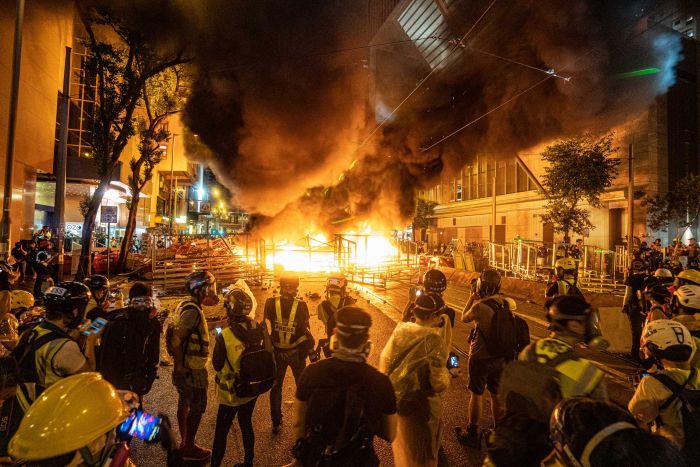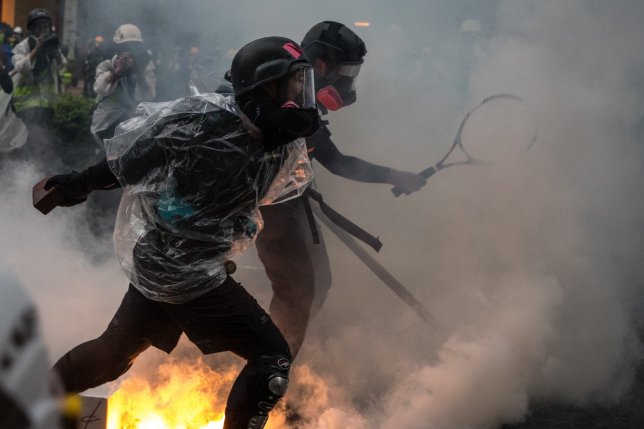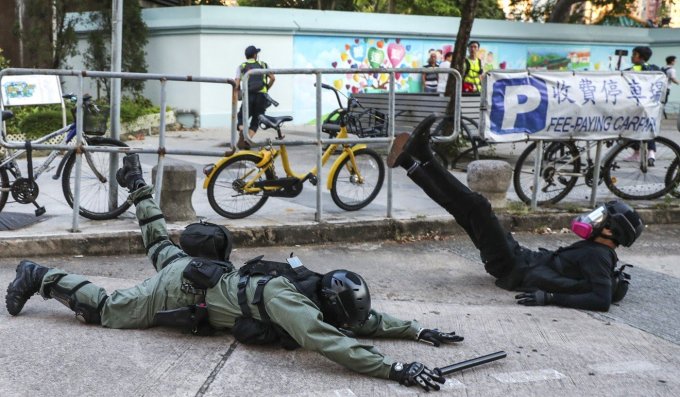It has been heartbreaking to watch my adopted city tearing itself apart and becoming awash with anger and hatred. The events that have led to this are well known both in Hong Kong and around the world and I am not going to rehearse them here. I did in fact sketch my own narrative of the events for this blog, but in the end I deleted it. This was partly because I realised that there are details that I am not yet clear about (perhaps I never will be) but also because I know that however neutral a tone I may try to adopt, someone will object to the way I have represented some event and will want to put a different spin on it.
The atmosphere in Hong Kong has in fact become so poisonous that it is hard to talk about what is going on at all without upsetting somebody. It seems that we are all expected to take sides. If you criticise something that one side has done, or even suggest that something they say may not be entirely true, supporters of that side will assume that you are on the other side and therefore part of the enemy. This pressure to take sides is generating large amounts of anger and hatred as well as poisoning relationships, both among friends and within families. It is also making any kind of peaceful resolution to the conflict hard to achieve.
Some of the symptoms of taking sides that I have observed include the following.
Constantly heaping blame on the other side.
It’s as if some people believe that if they if they can clearly demonstrate that all the blame for what is happening belongs to the other side, then their side will have won and the situation will resolve itself. This is not to deny that some people have done some blameworthy things for which they must eventually be held to account, but the current blame game is getting us nowhere.
Finding excuses for everything our side does.
This of course is related to the first symptom. People will sometimes admit that perhaps some actions taken by someone on their side went a bit too far, but there is always an excuse (“you must understand the reasons why they are so angry”, or “you should look at the root cause of the problem”, or “you must understand how they have been provoked, attacked and threatened”) and there is a refusal to publicly and clearly condemn such actions. There is also the “What about ….” gambit, by which criticism of bad behaviour on one side is somehow felt to be excused by citing examples of bad behaviour on the other side.
This seems to be motivated on the protesters side by a feeling that it is important to maintain solidarity. If they publicly criticise other protesters they may split and weaken “the movement”. On the other side, the importance of maintaining police morale is emphasised, as the police are the only barrier between us and “those trying to destroy the rule of law”.
Believing and spreading rumours that discredit the other side.
Hong Kong is full of rumours. One side will pick up or perhaps simply create a rumour that discredits the other side and spread it widely as if it were an indisputable fact. Very often they will also base their own further actions on the assumption that the rumour is true. Rumours that I have seen or heard presented as facts include:
- That the most extreme violent acts on the protesters side have in fact been committed or instigated by plain clothes police who have infiltrated into the ranks of the protesters;
- That among the police clashing with protesters are many Putonghua speaking officers (ie from north of the border);
- That the police beat to death or “executed” six, later reduced to three, protesters and secretly disposed of their bodies;
- That police sexually molest young female protesters that they detain;
- That young girls have been pressured into having sex with the male “warriors” among the protesters;
- That foreign agents have been observed handing over large sums of money to leaders of the protests.
There have been many more such rumours, some quite bizarre.

It is possible that we shall eventually discover that there is a basis in truth for some of these rumours. The point is, however, that people are presenting them as facts at a time when no credible evidence for them has been produced and they could not possibly know whether the rumours are true or not. But the fact that they discredit the other side is good enough.
Producing and spreading short video clips showing the awful behaviour of the other side
Anyone on social media (which seems to be almost everyone in Hong Kong) has been subjected to a blizzard of video clips showing police brutally beating protesters, police attacking innocent passers by, protesters surrounding and attacking police with lethal weapons, protesters punching and kicking “ordinary citizens”, etc. etc. Videos can of course give us valuable virtual “eye-witness” evidence of what is going on. The problem is that many of these videos are less than half a minute long. It should be obvious that it is not possible to fairly interpret any incidents shown in such clips without knowing a lot more about the events leading up them as well as subsequent events. Yet these short video clips are widely shared, usually accompanied by comments expressing horror and outrage at what the other side is doing.
Impugning the motives of the other side
This often amounts to a claim to be able to read the minds of the other side and know that what they say they want is not what they really want. Thus, the protesters are “really” motivated by a hatred of China, and a desire to achieve Hong Kong independence. The government is “really” part of a conspiracy aiming to take away Hong Kong’s remaining freedoms and tighten the control of the Chinese Communist Party in Hong Kong. The hardest thing to admit is that there might be well-intentioned people on both sides who just see things differently.
Not taking sides does not mean that we must never take a stand against things that are clearly wrong. For example, it’s hard not to have sympathy for the protesters. Many of them are young people with good reasons for feeling angry about much that has been happening in Hong Kong. They are brave and idealistic, and have had to risk serious injury and arrest for their cause, which they see as a fight for freedom and democracy. But having sympathy for them does not mean that we can’t say that some of the things that the so-called “radical protestors” have done are simply wrong. Wrong not just morally but also tactically, as they are endangering Hong Kong’s freedoms rather than defending them. In fact not to point this out to them, or even worse to encourage them in misguided actions, is a kind of betrayal.
One can also feel sympathy for the police. They have been put in an impossible position between the anger of the protesters and an unresponsive government. They have been insulted, attacked with various home-made weapons and had petrol bombs thrown at them. Their families have also been threatened. But this does not mean that we can’t criticise them for at times being far more aggressive, even brutal, than necessary, or for sometimes failing to distinguish between peaceful protesters (or even journalists and onlookers) and truly violent activists.
One can feel sympathy for members of the government’s Executive Committee that originally proposed the extradition bill. Rather than being part of some anti-democratic conspiracy, it seems much more likely that at least some of them had no idea that the bill would spark so much opposition and genuinely felt it was important for Hong Kong not to be a refuge for fugitive criminals from the Mainland. They now find themselves widely hated. But this in no way excuses their support of the Chief Executive Carrie Lam in dismissing the opposition and trying to ram the bill through with insufficient opportunity for consultation, discussion and amendment.

One can even have some sympathy for the Chinese government. Although I do not know this for sure, it does seem likely that they had nothing to do with the initial proposal for the bill that would have allowed alleged criminal fugitives to be extradited to the Mainland, and the uproar in Hong Kong probably came as a nasty shock to them. Perhaps they genuinely feel that they have been rather indulgent to the people of Hong Kong, who enjoy many rights and freedoms unknown on the Mainland and who therefore, in their view, ought to show a bit more gratitude and patriotism. But this in no way excuses their disgusting, but I’m afraid quite successful, attempts to ignore the huge numbers of peaceful Hong Kong citizens who have turned out in opposition to the bill and to convince their own citizens that Hong Kong is on the brink of anarchy due to groups of violent thugs who are demanding independence for Hong Kong and who are financed and manipulated by sinister foreigners.
The above perspectives of course contain my own opinions, based on what I have seen and heard to date. These opinions may well change as things become clearer. But the important thing, it seems to me, is not to start with an assumption that our side is right and their side is wrong, but to try to make sense of what is going on as objectively as possible and to be open to the possibility both that others are acting in good faith and that what we believe to be true may not in fact be entirely true.
The Buddha taught that attachment to views is one of the obstacles to spiritual progress. If I understand this correctly, it is not about whether a particular view is right or wrong. It is about how one holds the view. Sticking dogmatically to a right view is as much an obstacle as sticking dogmatically to a wrong view. Attachment to views not only prevents us from revising our views as we become aware of factors we hadn’t originally taken into account, it is also destructive of our relationships with others. I have certainly not been immune from this. If someone says something I disagree with, I feel the urge to immediately “put them right”. Even if someone says something I largely agree with but I suspect they haven’t properly thought through, I love to play devil’s advocate to see how they deal with it. This is perhaps an occupational hazard of academia, but it is very irritating to others.
I think I do this kind of thing less than I used to, partly because I have become more mindful of it, and partly because I have become much more ambivalent about things that I was once sure of. Ambivalence is sometimes seen as a weakness, making one indecisive and irresolute. However, ambivalence can be a positive quality. At its best, it is a recognition that most issues – and people – are a good deal more complicated than they first appear, and also that it is a normal human condition to have contradictory ideas and feelings about people and things bumping about in one’s mind. But I am not ambivalent about saying that a lot more ambivalence would certainly be helpful in Hong Kong at the present time.
There is a deeper but much more challenging way of thinking about these matters, as famously set out by Thich Nhat Hahn in a 1991 article in the Los Angeles Times, titled “We Are the Beaters; We Are the Beaten.” I was recently reminded of this article when reading What Is Buddhist Enlightenment by Dale S. Wright (OUP, 2016). The author devotes a large part of his first chapter to discussing Thich Nhat Hahn’s article and its implications.
Thich Nhat Hahn wrote the article in the wake of the brutal beating of Rodney King by the Los Angeles Police Department. He begins by saying that he is able to see himself not only as the victim of the beating but also as the policemen doing the beating. As he puts it:
Everything is like a bomb ready to explode, and we are part of the bomb. We are co-responsible for that bomb. That is why I saw myself as the policemen beating the driver. We are all these policemen.
He goes on to write: From the Buddhist perspective, I have not practiced deeply enough to transform the situation with the policemen. I have allowed violence and misunderstanding to exist. Realizing that, I suffer with them, for if they do not suffer, then why would they do what they did? Only when you suffer much do you make other people suffer; if you are happy, if you are liberated, then there will not suffering in you to spill over to others.
Looking at it in this way, all of us in Hong Kong bear some responsibility for contributing to the causes and conditions that have allowed hatred, anger and violence to arise in our society. And we all bear some responsibility for finding ways to dissipate the hatred, anger and violence.
This seems to me to be profoundly true, yet I still feel some ambivalence about its application. I can accept intellectually the principle of interdependent arising that underlies Thich Nhat Hahn’s words, but I cannot truly say that I am yet able to feel it “in my bones” in a way that could motivate my every action. I also wonder how possible it is to talk in this way to those with no knowledge of Buddhist teachings. But perhaps there is no other way. Certainly, healing in Hong Kong will only really begin when large numbers of us from all sides take some personal responsibility for the unkind things that have been said and done and look together for ways to stop such a situation arising again.


It is a very profound teaching that one’s own practicing deeply has a positive impact on others, and in small ways I know this is true. Yet it never seems to work with large scale movements that turn violent. … I wonder if there’s some transcendental formular for the necessary ratio for right effort to out balance wrong action.
As ever, an incisive and thought-provoking analysis Graham.
Thank fir your comments, Gillian and Sarah. I agree that it is often hard to believe that one’s own paltry efforts could possibily make any significant difference but I suppose it’s worth telling ourselves that we can never know what effects our actions will have as they ripple out into the world. I’m sure there is no formula! Also of course we are not the only ones. If everybody believes they could make no difference and so does nothing, then definitely nothing changes.
I felt this simile from the Sutta remind both sides need remain calm and allow peaceful dialog.
“If there is a pot of water heated on the fire, the water seething and boiling, a man with a normal faculty of sight, looking into it, could not properly recognize and see the image of his own face. In the same way, when one’s mind is possessed by ill-will, overpowered by ill-will, one cannot properly see the escape from the ill-will which has arisen; then one does not properly understand and see one’s own welfare, nor that of another, nor that of both; and also texts memorized a long time ago do not come into one’s mind, not to speak of those not memorized.”
— SN 46:55, Buddha